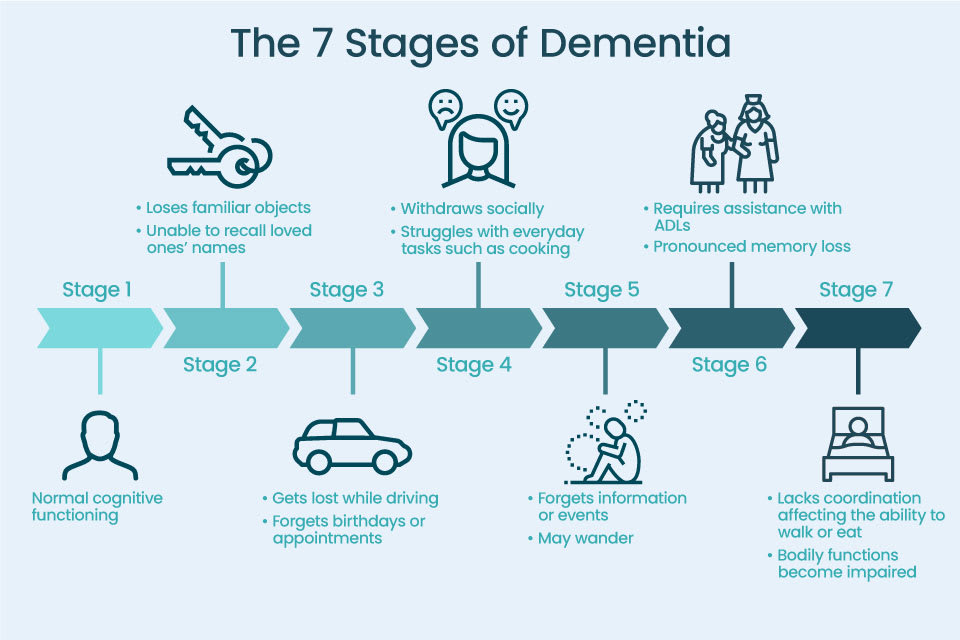Navigating the Labyrinth: Understanding the 7 Phases of Dementia
Associated Articles: Navigating the Labyrinth: Understanding the 7 Phases of Dementia
Introduction
On this auspicious event, we’re delighted to delve into the intriguing subject associated to Navigating the Labyrinth: Understanding the 7 Phases of Dementia. Let’s weave fascinating info and provide contemporary views to the readers.
Desk of Content material
Navigating the Labyrinth: Understanding the 7 Phases of Dementia

Dementia, a debilitating and progressive neurological dysfunction, impacts hundreds of thousands worldwide. Characterised by a decline in cognitive talents, together with reminiscence, pondering, and judgment, it considerably impacts a person’s means to carry out day by day duties and preserve their independence. Whereas there are numerous forms of dementia, Alzheimer’s illness accounts for almost all of circumstances. Understanding the development of dementia, typically categorized into phases, is essential for caregivers, households, and healthcare professionals to supply applicable help and care. This text explores a generally used seven-stage mannequin, highlighting the attribute adjustments at every stage and providing insights into managing the challenges at every stage.
This seven-stage mannequin, whereas not universally standardized throughout all healthcare settings, gives a helpful framework for understanding the trajectory of the illness. It is vital to keep in mind that the development varies drastically between people, and the timeline for transferring by means of every stage shouldn’t be uniform. Some people could progress quickly, whereas others expertise a slower decline. This mannequin serves as a normal guideline relatively than a exact prediction.
Stage 1: No Impairment (Regular Functioning)
This preliminary stage represents regular cognitive operate. People on this stage present no noticeable indicators of cognitive decline. Reminiscence, pondering, and judgment are all throughout the anticipated vary for his or her age and training stage. Every day actions are carried out with out problem, and social interactions are unaffected. This stage serves as a baseline for comparability because the illness progresses. Whereas people on this stage should not experiencing dementia, it is essential to emphasise the significance of sustaining a wholesome way of life, together with common train, a balanced weight loss plan, cognitive stimulation, and social engagement, to probably delay the onset or sluggish the development of cognitive decline later in life.
Stage 2: Very Gentle Cognitive Decline (Forgetfulness)
This stage marks the refined beginnings of cognitive impairment. People could expertise occasional forgetfulness, reminiscent of misplacing objects or forgetting appointments. These cases are sometimes attributed to regular age-related adjustments and is probably not readily obvious to others. Nonetheless, refined adjustments in cognitive efficiency could also be detectable by means of formal neuropsychological testing. People on this stage are often nonetheless capable of operate independently and preserve their social roles with out vital problem. Early detection at this stage is essential, because it permits for the implementation of methods to sluggish the development of the illness. Way of life modifications and cognitive coaching packages could be useful.
Stage 3: Gentle Cognitive Impairment (Noticeable Deficits)
On this stage, cognitive deficits turn into extra noticeable and impression day by day functioning. People could expertise problem remembering latest occasions, battle with advanced duties, and have challenges with word-finding. They could additionally exhibit decreased judgment, problem concentrating, and refined adjustments in character. These adjustments are sometimes obvious to household and pals. Whereas they’ll nonetheless handle most day by day actions independently, they could require extra help with advanced duties or decision-making. This stage warrants a radical medical analysis to rule out different causes of cognitive impairment and to provoke applicable administration methods. Assist teams and cognitive rehabilitation therapies could be useful at this stage.
Stage 4: Reasonable Cognitive Decline (Confusion and Disorientation)
This stage marks a big decline in cognitive talents. People expertise elevated confusion and disorientation, significantly relating to time and place. They could have problem remembering private info, battle with easy calculations, and exhibit impaired judgment. Every day actions require extra help, and so they could turn into misplaced simply or have hassle managing their funds. Persona adjustments, reminiscent of irritability, nervousness, or melancholy, could turn into extra pronounced. Caregivers typically play a vital function in offering help and help with day by day residing duties. Specialised therapies, reminiscent of occupational remedy and speech remedy, may also help to keep up practical talents.
Stage 5: Reasonably Extreme Cognitive Decline (Important Help Required)
At this stage, people require vital help with day by day residing actions. They could have problem recognizing relations, have vital reminiscence loss, and battle with primary communication. Incontinence could turn into an issue, and so they could expertise adjustments in sleep patterns. Wandering and agitation are widespread, posing security issues. Steady supervision and care are crucial, typically requiring institutionalization in a nursing residence or assisted residing facility. Caregivers want vital emotional and sensible help at this stage.
Stage 6: Extreme Cognitive Decline (Lack of Speech and Motor Abilities)
This stage is characterised by a extreme lack of cognitive and bodily talents. People lose the flexibility to speak successfully, and their motor abilities considerably decline. They’re unable to carry out any day by day actions independently and require whole care. They could expertise problem swallowing and have issues with mobility. This stage requires specialised medical care and 24-hour supervision. Consolation and palliative care turn into the first focus.
Stage 7: Very Extreme Cognitive Decline (Lack of Consciousness and Responsiveness)
This remaining stage represents essentially the most superior stage of dementia. People lose consciousness of their environment and are unresponsive to stimuli. They could have problem sustaining primary bodily features and require fixed medical care. This stage includes managing bodily signs and offering consolation care to the person. The main focus shifts to making sure the person’s dignity and offering emotional help to their family members.
Conclusion:
Navigating the seven phases of dementia requires a multifaceted strategy that includes medical professionals, caregivers, and relations. Early prognosis and intervention are essential to slowing the development of the illness and bettering the standard of life for the person and their family members. Every stage presents distinctive challenges, requiring tailor-made help and care. Understanding the standard development and anticipating the wants at every stage permits for higher planning and preparation, enabling people and households to deal with the illness successfully and preserve a way of hope and dignity all through the journey. It’s important to keep in mind that each particular person’s expertise with dementia is exclusive, and the phases function a normal guideline, not a inflexible prediction. Searching for skilled help and becoming a member of help teams can present invaluable assets and emotional help for households navigating this advanced and difficult situation.








Closure
Thus, we hope this text has supplied invaluable insights into Navigating the Labyrinth: Understanding the 7 Phases of Dementia. We thanks for taking the time to learn this text. See you in our subsequent article!